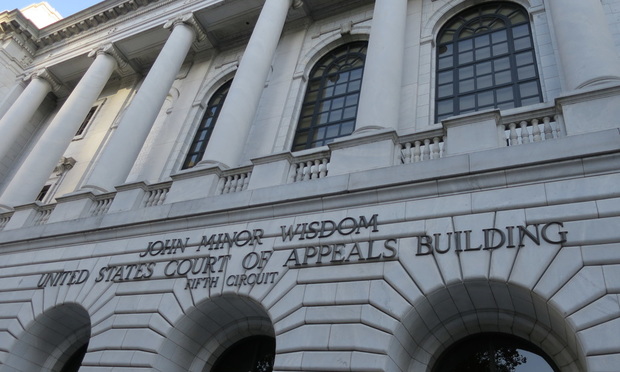'Hodge' Brings Circuits into Alignment on Mortgage Fraud Claims
The False Claims Act is a powerful tool that the government can use to address sweeping frauds. After 'Hodge,' it can prove aggregate losses that result from a pattern of fraudulent conduct.
October 21, 2019 at 11:43 AM
6 minute read
 U.S. Court of Appeals for the Fifth Circuit in New Orleans/photo by Mike Scarcella / ALM Media
U.S. Court of Appeals for the Fifth Circuit in New Orleans/photo by Mike Scarcella / ALM Media
The False Claims Act imposes treble damages for any losses the federal government "sustains because of" fraud. But how do courts tell when the government suffers losses "because of" fraud? This question can prove surprisingly complex in mortgage fraud cases under the FCA, and it does not arise in other mortgage litigation, such as cases pursuing repurchase remedies under a pooling and servicing agreement.
Until recently, federal circuit courts appeared divided on the causation standard for mortgage fraud claims under the FCA. But a recent Fifth Circuit decision in United States v. Hodge clarifies the standard and brings the circuits into alignment. By allowing proof of causation at a higher level of generality, it also paves the way for the government and private relators to bring FCA claims in cases with large numbers of misstatements.
The Federal Housing Authority's Mortgage Insurance Program
The Department of Housing and Urban Development administers a mortgage insurance program. A mortgage only qualifies for insurance from HUD if it complies with extensive criteria relating to the buyer's finances and the value of the home. Lenders must certify that mortgages they submit meet HUD's requirements.
Unfortunately, lenders sometimes fraudulently submit loans that do not qualify. When those loans default, HUD must make insurance payments worth hundreds of thousands of dollars. HUD's ability to recover under the FCA depends on whether it suffered losses "because of" the lender's fraudulent statements.
The Law Before United States v. Hodge
When do false statements in an application for mortgage insurance "cause" HUD to suffer a loss? The U.S. Supreme Court has interpreted the FCA in light of common-law principles. At common law, causation had two elements, "but-for" and "proximate" causation. But-for causation is satisfied if a loss would not have occurred without a defendant's conduct. Proximate causation, in turn, requires the loss to have a direct and foreseeable relationship to the defendant's conduct and the type of risk it created.
Applying common-law principles, courts have reached a consensus that but-for causation, standing alone, does not meet the FCA's requirements. Thus, the mere fact that HUD would not have insured a mortgage if it had known the truth does not suffice. The government must also prove proximate causation.
The question of when a misstatement has a direct and foreseeable relationship to default appeared to divide circuit courts until recently. The Fifth Circuit, in a case called United States v. Miller, stated that the government must "show that the false statements in the application were the cause of subsequent defaults." The Ninth and D.C. Circuits, in contrast, held that a false statement has a direct and foreseeable relationship to HUD's loss if it concerns factors that affect the likelihood of repayment, such as the borrower's creditworthiness.
Many defendants interpreted the Fifth Circuit to apply a much stricter standard, thereby limiting the types of claims available. The government can satisfy the standard applied by the Ninth and D.C. Circuits through proof about the false statements and the types of risk they concealed. Defendants argued that the Fifth Circuit's standard, in contrast, required proof about the ultimate cause of default. Such proof is difficult, if not impossible. Defaults often have many causes, and no single factor alone is sufficient. Requiring detailed proof of a single cause would impose a significant barrier to cases based on a large number of loans.
United States v. Hodge
The Fifth Circuit's decision in Hodge rejected a restrictive interpretation of Miller. The government had alleged that a lender had fraudulently submitted mortgages for HUD insurance over a period of 10 years. At trial, it analyzed a statistical sample and found that 53.7% of the lender's defaulted loans contained misrepresentations about factors that significantly affected the likelihood of repayment. The government also showed that the lender's loans had defaulted at higher rates than those submitted by other lenders. Extrapolating from its sample, the government argued that the lender had submitted 1,196 fraudulent loans, causing HUD $86 million in losses.
The defendants contended that, under Miller, the government had not proved that any false statements "were the cause of subsequent defaults." The Fifth Circuit disagreed. It noted that proof on a loan-by-loan basis would not be feasible in a case involving over one thousand loans. Rather than demand such proof, it instead examined the risk created by the lender's conduct in the "aggregate." The lender's systematic disregard for HUD's requirements, which were designed to reduce the risk of default, bore a direct and foreseeable relationship with HUD's subsequent losses. Thus, regardless of whether the government had traced each default to a specific misstatement, it had proved that the lender's pattern of fraud concealed the very risks that had caused HUD to suffer losses.
Implications
Hodge has significant implications. First, it demonstrates that Fifth Circuit does not apply the restrictive causation standard some defendants had attributed to Miller. The Fifth Circuit's willingness to examine conduct in the aggregate confirms that, like the Ninth and D.C. Circuits, it permits the government to prove proximate causation by showing that false statements concealed the type of risk that ultimately materialized.
Hodge also confirms that the FCA is a powerful tool that the government and private relators can use to address sweeping frauds. The government need not submit endless proof about the loss attributable to each specific misstatement. Instead, it can prove the aggregate losses that result from a pattern of fraudulent conduct, including through statistical sampling. That flexibility demonstrates that the days of large, high-value FCA suits are far from over.
Caleb Hayes-Deats is an attorney at MoloLamken. Formerly, he was an assistant U.S. attorney in the Southern District of New York and served on the trial team that litigated the case discussed in this article. The ideas set forth in this article are his alone and do not necessarily reflect the views of the Department of Justice.
This content has been archived. It is available through our partners, LexisNexis® and Bloomberg Law.
To view this content, please continue to their sites.
Not a Lexis Subscriber?
Subscribe Now
Not a Bloomberg Law Subscriber?
Subscribe Now
NOT FOR REPRINT
© 2025 ALM Global, LLC, All Rights Reserved. Request academic re-use from www.copyright.com. All other uses, submit a request to [email protected]. For more information visit Asset & Logo Licensing.
You Might Like
View All
Bill Would Allow Californians to Sue Big Oil for Climate-Linked Wildfires, Floods
3 minute read
Insurance Policies Don’t Cover Home Depot's Data Breach Costs, 6th Circuit Says

State High Court Bucks Trend Favoring Insurers, Sides With Restaurants Seeking COVID-19 Coverage
Trending Stories
- 1Uber Files RICO Suit Against Plaintiff-Side Firms Alleging Fraudulent Injury Claims
- 2The Law Firm Disrupted: Scrutinizing the Elephant More Than the Mouse
- 3Inherent Diminished Value Damages Unavailable to 3rd-Party Claimants, Court Says
- 4Pa. Defense Firm Sued by Client Over Ex-Eagles Player's $43.5M Med Mal Win
- 5Losses Mount at Morris Manning, but Departing Ex-Chair Stays Bullish About His Old Firm's Future
Who Got The Work
J. Brugh Lower of Gibbons has entered an appearance for industrial equipment supplier Devco Corporation in a pending trademark infringement lawsuit. The suit, accusing the defendant of selling knock-off Graco products, was filed Dec. 18 in New Jersey District Court by Rivkin Radler on behalf of Graco Inc. and Graco Minnesota. The case, assigned to U.S. District Judge Zahid N. Quraishi, is 3:24-cv-11294, Graco Inc. et al v. Devco Corporation.
Who Got The Work
Rebecca Maller-Stein and Kent A. Yalowitz of Arnold & Porter Kaye Scholer have entered their appearances for Hanaco Venture Capital and its executives, Lior Prosor and David Frankel, in a pending securities lawsuit. The action, filed on Dec. 24 in New York Southern District Court by Zell, Aron & Co. on behalf of Goldeneye Advisors, accuses the defendants of negligently and fraudulently managing the plaintiff's $1 million investment. The case, assigned to U.S. District Judge Vernon S. Broderick, is 1:24-cv-09918, Goldeneye Advisors, LLC v. Hanaco Venture Capital, Ltd. et al.
Who Got The Work
Attorneys from A&O Shearman has stepped in as defense counsel for Toronto-Dominion Bank and other defendants in a pending securities class action. The suit, filed Dec. 11 in New York Southern District Court by Bleichmar Fonti & Auld, accuses the defendants of concealing the bank's 'pervasive' deficiencies in regards to its compliance with the Bank Secrecy Act and the quality of its anti-money laundering controls. The case, assigned to U.S. District Judge Arun Subramanian, is 1:24-cv-09445, Gonzalez v. The Toronto-Dominion Bank et al.
Who Got The Work
Crown Castle International, a Pennsylvania company providing shared communications infrastructure, has turned to Luke D. Wolf of Gordon Rees Scully Mansukhani to fend off a pending breach-of-contract lawsuit. The court action, filed Nov. 25 in Michigan Eastern District Court by Hooper Hathaway PC on behalf of The Town Residences LLC, accuses Crown Castle of failing to transfer approximately $30,000 in utility payments from T-Mobile in breach of a roof-top lease and assignment agreement. The case, assigned to U.S. District Judge Susan K. Declercq, is 2:24-cv-13131, The Town Residences LLC v. T-Mobile US, Inc. et al.
Who Got The Work
Wilfred P. Coronato and Daniel M. Schwartz of McCarter & English have stepped in as defense counsel to Electrolux Home Products Inc. in a pending product liability lawsuit. The court action, filed Nov. 26 in New York Eastern District Court by Poulos Lopiccolo PC and Nagel Rice LLP on behalf of David Stern, alleges that the defendant's refrigerators’ drawers and shelving repeatedly break and fall apart within months after purchase. The case, assigned to U.S. District Judge Joan M. Azrack, is 2:24-cv-08204, Stern v. Electrolux Home Products, Inc.
Featured Firms
Law Offices of Gary Martin Hays & Associates, P.C.
(470) 294-1674
Law Offices of Mark E. Salomone
(857) 444-6468
Smith & Hassler
(713) 739-1250









